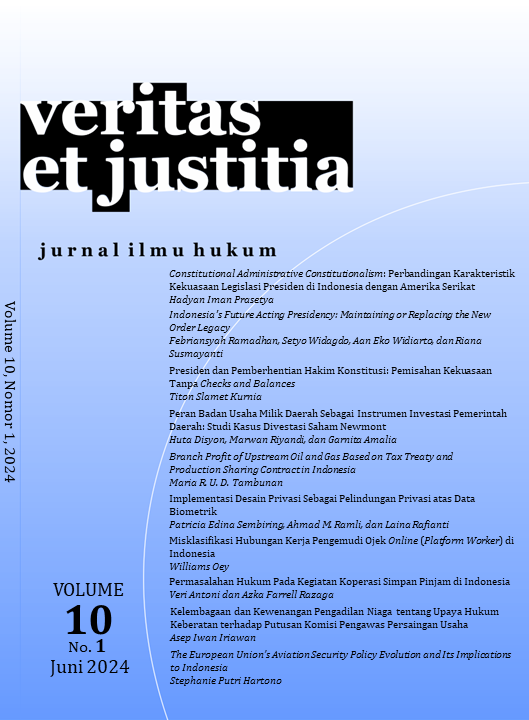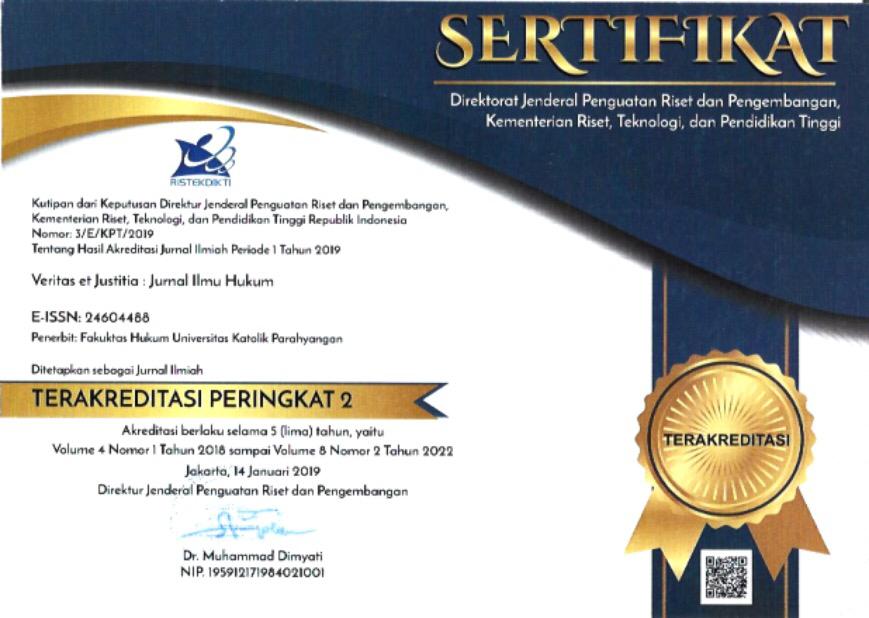PRESIDEN DAN PEMBERHENTIAN HAKIM KONSTITUSI: PEMISAHAN KEKUASAAN TANPA CHECKS AND BALANCES
DOI:
https://doi.org/10.25123/vej.v10i1.7735Kata Kunci:
checks and balances; constitutional court; presidential decisionAbstrak
On September 29, 2022, the People’s Representative Council (DPR) controversially removed Justice Aswanto and proposed Guntur Hamzah as his successor. Following the DPR’s decision, the President issued Presidential Decision Number 114/P of 2022. This process aligns with Article 24C paragraph (3) of the 1945 Constitution of the Republic of Indonesia, which states: “The Constitutional Court is comprised of nine Justices who are appointed by the President, of whom three are proposed by the Supreme Court, three by the People’s Representative Council, and three by the President.” This provision includes two clauses: the proposal clause and the appointment clause. This article discusses the President's role in implementing the appointment clause in the case of Justice Aswanto’s removal. Using a conceptual approach, it focuses on interpreting Article 24C paragraph (3) to understand that the President's role in the appointment clause embodies the principle of checks and balances. This article argues against the President’s legalistic position of implementing the appointment clause without scrutinizing the DPR’s decision. While the appointment clause does not explicitly authorize the President to refuse issuing the Presidential Decision, this norm may be inferred from our commitment to the supremacy of the constitution.
Referensi
Buku:
Andrei Marmor, Interpretation and Legal Theory, Princeton University Press, New Jersey, 2005.
Andrei Marmor, Law in the Age of Pluralism, Oxford University Press, Oxford, 2007.
Antonin Scalia, A Matter of Interpretation, Princeton University Press, New Jersey, 1997.
Brian Z. Tamanaha, On the Rule of Law: History, Politics, Theory, Cambridge University Press, Cambridge, 2004.
Charles M. Lamb and Jacob R. Neiheisel, Constitutional Landmarks: Supreme Court Decisions on Separation of Powers, Federalism and Economic Rights, Palgrave-MacMillan, London, 2021.
Eoin Carolan, The New Separation of Powers: A Theory for the Modern State, Oxford University Press, Oxford, 2009.
Hans Kelsen, Pure Theory of Law, University of California Press, California, 1967.
Paul Scholten, Penuntun dalam Mempelajari Hukum Perdata Belanda: Bagian Umum, Gadjah Mada University Press, Yogyakarta, 1993.
Sean Coyle, From Positivism to Idealism: A Study of the Moral Dimensions of Legality, Ashgate, Aldershot, 2007.
Terence Ball (editor), The Federalist with Letters of Brutus, Cambridge University Press, Cambridge, 2003.
Tim Penyusun, Naskah Komprehensif Perubahan Undang-Undang Dasar Negara Republik Indonesia Tahun 1945: Buku VI Kekuasaan Kehakiman, Sekretariat Jenderal dan Kepaniteraan Mahkamah Konstitusi, Jakarta, 2008.
Jurnal:
Adrian Vermeule, Connecting Positive and Normative Legal Theory, 10 University of Pennsylvania Journal of Constitutional Law 387, 2008.
Bruce G. Peabody and John D. Nugent, Toward a Unifying Theory of the Separation of Powers, 53 American University Law Review 1, 2003.
Fitri Atur Arum, Andini Firohmatika Wulandari, Elia Lailatussyafa’ah dan Abdian Saifullah, Analisis Kasus Pemberhentian Hakim Mahkamah Konstitusi oleh Dewan Perwakilan Rakyat, 13 Humani 351, 2023.
Graziella Romeo, The Conceptualization of Constitutional Supremacy: Global Discourse and Legal Tradition, 21 German Law Journal 904, 2020.
H.L.A. Hart, Positivism and the Separation of Law and Morals, 71 Harvard Law Review 593, 1958.
H. Jefferson Powell, The Original Understanding of Original Intent, 98 Harvard Law Review 885, 1985.
James E. Ryan, Laying Claim to the Constitution: The Promise of New Textualism, 97 Virginia Law Review 1523, 2011.
Jutta Limbach, The Concept of the Supremacy of the Constitution, 64 Modern Law Review 1, 2001.
Keith E. Whittington, The New Originalism, 2 Georgetown Journal of Law and Public Policy 599, 2004.
Lon L. Fuller, Positivism and Fidelity to Law – A Reply to Professor Hart, 71 Harvard Law Review 630, 1958.
M. Elizabeth Magill, Beyond Powers and Branches in Separation of Powers Law, 150 University of Pennsylvania Law Review 603, 2001.
Muhammad Fawwaz Farhan Farabi dan Tanaya, Polemik Legalitas Pemecatan Hakim Konstitusi oleh Lembaga Pengusul: Tinjauan Kasus Pemecatan Hakim Aswanto dan Implikasinya terhadap Kemandirian Kekuasaan Kehakiman, 2 Jurnal Hukum dan HAM Wara Sains 294, 2023.
Randy E. Barnett, Scalia’s Infidelity: A Critique of ‘Faint-Hearted’ Originalism, 75 University of Cincinnati Law Review 7, 2006.
Ridarson Galingging, Implikasi Hukum dan Politik Pemberhentian Hakim Mahkamah Konstitusi oleh Dewan Perwakilan Rakyat, 14 Adil: Jurnal Hukum 25, 2023.
Riska Ari Amalia dan Ashari, Polemik dalam Keputusan Presiden Nomor 114/P/2022, 5 Unnes Law Review 2113, 2023.
Robert S. Summers, ‘Is’ and ‘Ought’ in Legal Philosophy, 13 The Philosophical Quarterly 157, 1963 .
Robin West, Reconsidering Legalism, 88 Minnesota Law Review 119, 2003.
Ronald Dworkin, Hard Cases, 88 Harvard Law Review 1057, 1975.
S. Prakash Sinha, The Fission and Fusion of Is-Ought in Legal Philosophy, 21 Villanova Law Review 839, 1976.
Saikrishna B. Prakash, The Executive Duty to Disregard Unconstitutional Laws, 96 Georgetown Law Journal 1613, 2008.
Steven G. Calabresi and Joan L. Larsen, One Person, One Office: Separation of Powers or Separation of Personnel?, 79 Cornell Law Review 1045, 1994.
Susi Dwi Harijanti, Pengisian Jabatan Hakim: Kebutuhan Reformasi dan Pengekangan Diri, 21 Jurnal Hukum Ius Quia Iustum 531, 2014.
Thomas W. Merill, The Constitutional Principle of Separation of Powers, 1991 The Supreme Court Review 225, 1991.
Titon Slamet Kurnia, Recall Aswanto: Tertutupnya Ruang Disagreement antara Pembentuk Undang-Undang dan Mahkamah Konstitusi, 7 Refleksi Hukum: Jurnal Ilmu Hukum 143, 2023.
Antologi:
Lawrence B. Solum, What is Originalism? The Evolution of Contemporary Originalist Theory, dalam Grant Huscroft and Bradley W. Miller (editors), The Challenge of Originalism: Theories of Constitutional Interpretation, Cambridge University Press, Cambridge, 2011.
Peraturan:
Undang-Undang Dasar Negara Republik Indonesia Tahun 1945.
Undang-Undang Nomor 7 Tahun 2020 tentang Perubahan Ketiga atas Undang-Undang Nomor 24 Tahun 2003 tentang Mahkamah Konstitusi (Lembaran Negara Republik Indonesia Tahun 2020 Nomor 216, Tambahan Lembaran Negara Republik Indonesia Nomor 6554).
Putusan Pengadilan:
Putusan Mahkamah Konstitusi Nomor 96/PUU-XVIII/2020 perihal Pengujian Undang-Undang Nomor 7 Tahun 2020 tentang Perubahan Ketiga atas Undang-Undang Nomor 24 Tahun 2003 tentang Mahkamah Konstitusi terhadap Undang-Undang Dasar Negara Republik Indonesia Tahun 1945.
Putusan Mahkamah Konstitusi Nomor 103/PUU-XX/2022 perihal Pengujian Undang-Undang Nomor 7 Tahun 2020 tentang Perubahan Ketiga atas Undang-Undang Nomor 24 Tahun 2003 tentang Mahkamah Konstitusi terhadap Undang-Undang Dasar Negara Republik Indonesia Tahun 1945.
Situs Daring:
https://www.cnnindonesia.com/nasional/20221001124114-12-855021/mahfud-jokowi-tak-bisa-tolak-pencopotan-aswanto-dari-hakim-mk diakses pada tanggal 3 Januari 2024 pukul 16.45 WIB.
https://news.detik.com/berita/d-6321198/hakim-mk-aswanto-dicopot-ketua-komisi-iii-produk-dpr-dia-anulir diakses pada tanggal 3 Januari 2024 pukul 16.50 WIB.
https://www.setneg.go.id/baca/index/presiden_jokowi_saksikan_pengucapan_sumpah_m_guntur_hamzah_sebagai_hakim_konstitusi#:~:text=Pengangkatan%20Guntur%20sebagai%20hakim%20konstitusi,Diajukan%20oleh%20Dewan%20Perwakilan%20Rakyat diakses pada tanggal 3 Januari 2024 pukul 16.52 WIB.
##submission.downloads##
Diterbitkan
Terbitan
Bagian
Lisensi
Hak Cipta (c) 2024 Titon Slamet Kurnia

Artikel ini berlisensi Creative Commons Attribution-NonCommercial 4.0 International License.
Authors who publish with this journal agree to the following terms:
Authors retain copyright and grant the journal right of first publication with the work simultaneously licensed under a Creative Commons Attribution License that allows others to share the work with an acknowledgement of the work's authorship and initial publication in this journal.
Authors are able to enter into separate, additional contractual arrangements for the non-exclusive distribution of the journal's published version of the work (e.g., post it to an institutional repository or publish it in a book), with an acknowledgement of its initial publication in this journal.
Authors are permitted and encouraged to post their work online (e.g., in institutional repositories or on their website) prior to and during the submission process, as it can lead to productive exchanges, as well as earlier and greater citation of published work.
The Journal allow the author(s) to hold the copyright and to retian publishing rights without restrictions.










